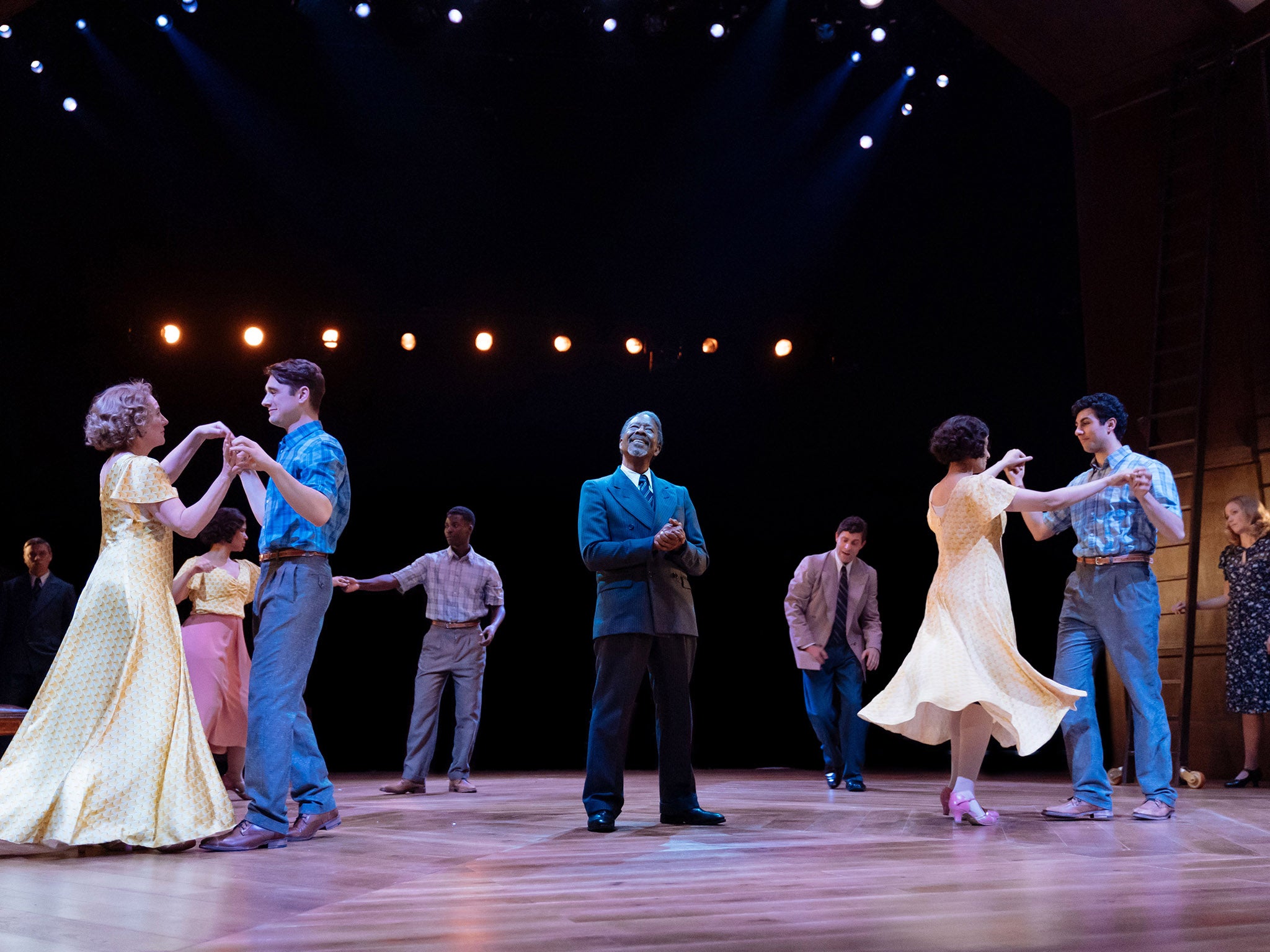The directors bringing a fresh approach to Arthur Miller plays with female-led, gender-fluid and black casts
New productions of ‘The Crucible’, ‘Death of a Salesman’ and ‘The American Clock’ are helping to keep theatre more varied and relevant. Holly Williams reports

There are a number of Arthur Miller plays on right now, from the David Suchet-starring The Price in the West End to a veritable takeover of Waterloo as the neighbouring Old Vic and Young Vic stage three of his plays in quick succession. This could smack of safe programming: after all, we know Miller – or we think we do. We probably studied him at school. He’s the great chronicler of the failures of the American Dream, but he’s also a box-office dream; Death of a Salesman, The Crucible, All My Sons, A View From the Bridge are all easy titles to sell, especially with a bit of big-name casting.
But look a little closer and you’ll see that some of these productions are doing things rather differently – shaking up these old classics through bold approaches to casting. What happens to the stories you think you know when they’re performed by a black cast? Or when women take on the main roles? Welcome to woke Miller, if you will.
A female-led, gender-fluid The Crucible opens next month at The Yard in Hackney Wick; director Jay Miller (no relation) decided, after the Brett Kavanaugh hearings were likened to a witch hunt, that this play, about the actual Salem witch trials, should be handed over to women to tell. Caoilfhionn Dunne will play Proctor – the first time the estate has ever granted permission for the part to be played by a woman. Now overseen by the playwright’s daughter Rebecca Miller – herself a theatre director – the estate has been hugely supportive and open in all three productions, I’m assured.
Later this spring, Death of a Salesman opens at the Young Vic, with the central family – the Lomans – played by black actors, including Wendell Pierce, Sharon D Clarke and Arinze Kene. Marianne Elliott, who has form in breathing new life into a story with canny casting – as seen in her hugely successful gender-swapped production of Company – directs. Meanwhile up the road at the Old Vic, The American Clock – admittedly a lesser-performed Miller play from 1980, a kind of vaudeville look at the Great Depression – is already in full swing. Its director Rachel Chavkin has triple-cast the central family so they are now played by white Jewish, south Asian and African-American actors. At times, the three families flow and overlap; at others they pass the story from one to another for specific scenes, allowing different perspectives on how race, privilege and prosperity intersect to come to the fore.

While we are in an era where colour- and gender-blind productions of classics – especially Shakespeare – are sometimes barely worth remarking upon, it’s still fairly unusual for a rash of modern classics to be getting the same treatment. But actually, there’s nothing “blind” about these productions: all three directors have a clear vision for what they want to achieve with fluid, or non-traditional, casting.

For Jay Miller, it was about finding a very contemporary relevance in a 1953 play written about a 17th-century trial, that was itself initially a parable for the McCarthy era anti-communist witch hunts.
“How can a classic text identify for us what our future might look like unless we make some significant changes?” he says when discussing why he was drawn to The Crucible – the first ever revival staged at The Yard, which usually programmes new work. “When Miller was writing this play, the world was really really tense – that tension is back. I do see [The Crucible] as a bit of a warning of what happens when fear comes between relationships, whether that be romantic relationships, familial relationships, neighbourly relationships, societal relationships.”
Kavanaugh was the casting catalyst, however. “There were articles basically comparing him to Proctor in the States, and I thought, ‘god, this needs to be owned by a woman’,” says Miller.
The Crucible features young women who stand up in court and accuse others of witchcraft, in a trial that becomes wild and feverish. But they are led by Abigail, who appears to motivated by a desire for revenge against her former employer, John Proctor, an older man with whom she had an affair. Women being believed, or not, in court surely registers differently in the light of Kavanaugh – but in the play, they really are telling lies – how does that tension play out here?
“I think the court is so fundamentally dysfunctional, it just doesn’t work,” says Miller. “That’s what excited me as a potential – how is justice meted out in this town and how does that resonate with today? It’s about looking at who has power, how they wield it, who’s given them it, and can anyone change it?”
The decision to play with casting is, in all three productions, also an explicit reaction to these texts’ status as classics: casting can become a way to defamiliarise the plays, to make the familiar sound newly minted.
In Marianne Elliott’s production of Death of a Salesman, having a black actor playing Willy Loman, the ageing salesman who finds the American dream crumbling under the brutal realities of the capitalist system and the indifference of his male white colleagues, has proved revelatory. “You hear it afresh, like a completely new play,” she says. “Some of those searing lines, they just sing out to you as if you’ve never heard it before.”
Does his skin colour become what prevents Willy Loman from getting ahead? “That will hang in the minds of the audience as they watch the play hopefully, whether or not we are held back by prejudice or racism, or by our own faults and failing,” says co-director Miranda Cromwell. “Willy Loman’s boss is a young white man who seemingly has no care for this older black gentleman; you of course cannot help but overlay the racial prejudice of the time. It adds another filter, another layer.”
But such casting choices are also a question of representation: whose stories get told, who is seen onstage. Or, as Chavkin puts it, “who gets to be a hero”.
That was one of the reasons for triple-casting The American Clock. “We’re sometimes led to believe that a young black male face carries a story in a different way to a young white male face. One of the many things the production does is turn that over. It’s not all about casting, but casting is one of a myriad choices a director makes when trying to think about what is vibrant and vital about the story right now.”

For Elliott, who is keeping Death of a Salesman in its original period setting, it was not about rewriting history but bringing to the fore a history that is less well known: that of middle-class African-Americans in the late 1940s. “Actually, in lots of ways Willy Loman is incredibly successful. And there’s lots of evidence that there were very successful middle-class [African-American] businessmen, salesmen, bankers, you just don’t really hear those stories as much.” They haven’t needed to change a word of the script to make it work.
For Jay Miller, a fresh approach to casting is one way to make theatre more varied, vivid, and relevant. “There are lots of new things that can be found in the text if you play with bodies onstage,” he says. “We as directors need to think more deeply about what happens to an audience’s experience if lines they might be familiar with come out of a mouth they’re less familiar with, or who don’t usually say those lines. Not only is it politically right to do, but it’s also artistically really exciting.”
Is it incumbent, then, on directors to bring something new, or find something new, when reviving plays?
“I think the answer to your questions is yes, basically,” says Miller, adding that he thinks a director needs to have a really good reason to put on a revival of an existing play rather than new work.
Elliott agrees. “You’ve got to find what in the piece speaks to you, and speaks to the current day. Otherwise you’re just creating the same old museum pieces.”
The American Clock is at The Old Vic until 30 March; The Crucible is at The Yard 27 March to 11 May; Death of a Salesman is at the Young Vic 1 May to 29 June

Join our commenting forum
Join thought-provoking conversations, follow other Independent readers and see their replies
Comments
Bookmark popover
Removed from bookmarks